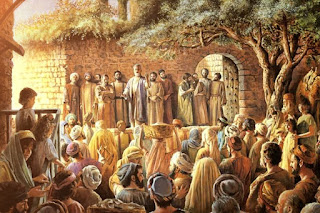At a senior adult Bible study group, a lady came up to the group leader and said, "I want you to know that I still have the faith I had as a small child." The group leader said she had to bite her tongue to avoid answering , "Oh, you poor thing!" I remember talking and praying with my kids as children, and being amazed at the questions they asked; they had come up with most of the classic questions that we don't have answers to, like "Who made God?" by the age of six. This is one of the times in our lives when we are asking the hard questions, and being disappointed that nobody on this earth has the answers. I love talking to these kids, but we don't want them to stay "stuck" at that spiritual age. It can happen, however, that people get "stuck" in an early stage of Christian knowledge. I have heard comments from folks who feel they had the kindergarten level of belief down pat but needed to go on to first grade.
The Jewish community realized during their captivity in Babylon, 2500 years ago, that they needed to make a special effort to keep their knowledge of God alive even without the city of Jerusalem and its Temple. This is where the Jewish synagogues got their start; the community could gather to pray, to read, to study, and to keep the traditions and their relationship to God alive in a pagan environment. Even after many of them were able to return to Judea and rebuild the temple, they still maintained the synagogues as a source of study and celebration. We know that Jesus normally went to synagogue services on the Sabbath, and he was often asked to read the Scriptures to the gathering. The Jews of the Greek and Roman periods were, as far as we know, generally literate, especially the men. There are passages in Acts that have the Temple establishment dismiss Jesus' followers as uneducated, but I believe that they were being classed as not being professional scholars like they (and St Paul) were. Today, Jewish boys (and girls, if they want) are expected to be able to read Scripture in public by the age of 12 or 13. This has evolved into the Bar Mitzvah event, where those being welcomed as being responsible for their own religious life recite a passage of Scripture in Hebrew, indicating their status as adults.
 We have the interesting story in Luke about a trip to a major celebration in Jerusalem when Jesus was 12 years old. I suspect that included in the event was the equivalent of a Bar Mitzvah, We do know that he passed the "test" with flying colors, and the head priests and scholars at the event were so impressed at his knowledge of Scripture that they wound up discussing it with him for three days. (When Mary and Joseph finally figure out where he was, his answer was that he needed to be "about His Father's business".) He had apparently had the lessons that were normal for his time and place, but He also had a direct line into the Source of wisdom, which He kept open until the end of His time on earth. He didn't make a big show out of His mastery of Scripture, but He did have it at His fingertips as needed. Our challenge: do we keep this connection open as well? I recall my grandmother still reading her Bible to the end of her long life (she lived to be 93, with mind completely clear). No matter how often we read it, we will keep finding new insights and challenges it--and it will keep us growing in faith as long as we are open for it.
We have the interesting story in Luke about a trip to a major celebration in Jerusalem when Jesus was 12 years old. I suspect that included in the event was the equivalent of a Bar Mitzvah, We do know that he passed the "test" with flying colors, and the head priests and scholars at the event were so impressed at his knowledge of Scripture that they wound up discussing it with him for three days. (When Mary and Joseph finally figure out where he was, his answer was that he needed to be "about His Father's business".) He had apparently had the lessons that were normal for his time and place, but He also had a direct line into the Source of wisdom, which He kept open until the end of His time on earth. He didn't make a big show out of His mastery of Scripture, but He did have it at His fingertips as needed. Our challenge: do we keep this connection open as well? I recall my grandmother still reading her Bible to the end of her long life (she lived to be 93, with mind completely clear). No matter how often we read it, we will keep finding new insights and challenges it--and it will keep us growing in faith as long as we are open for it.



